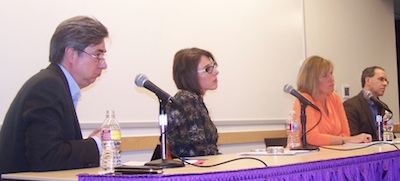By Janis Siegel , JTNews Correspondent
We are “citizens of the globe and cosmopolitans,” said Michael Rosenthal, professor and philosophy department chair at the University of Washington, as he introduced a UW panel, Circumcision as a Human Rights Issue, “and the rights of the child to bodily integrity have been pitted against the rights of parents to exercise religious liberty and raise their children according to the traditions of their faith.”
Citing the protections to minors in the United Nations General Assembly’s Convention on the Rights of the Child against bodily harm, two philosophers, an historian, and a social scientist spoke for one hour to a crowd of 75 about a growing movement seeking to limit circumcision, which is practiced around the world by many cultures and religions.
In 2010, a controversial ruling in a Cologne, Germany court acquitted a doctor who performed a circumcision on a Muslim boy who was later hospitalized with complications. However, an appellate court later condemned the non-medical religious ritual, saying it constituted “bodily harm” and that in the future, a doctor “could be held accountable even when the parents consented to the procedure, if the boy did not.
Rosenthal noted, however, that even in a religious context, people do often consider the medical benefits of circumcision when making the decision about whether to circumcise.
The March 4 program was sponsored by the Stroum Jewish Studies Program at the UW and the university’s Walter Chapin Simpson Center for the Humanities. The UW Department of Philosophy, and the Seattle Jewish Film Festival co-sponsored the event.
Thomas Schmidt, a professor of the philosophy of religion at the Johann Wolfgang Goethe-University in Frankfurt, Germany, advocated for a more conciliatory approach.
“The terms of peaceful coexistence must be negotiated,” said Schmidt. “There is a real and deep conflict between religious freedom and the right to bodily integrity. Legal regulation would not satisfy the religious.”
Arguing the opposite view, however, Schmidt said the only morally acceptable act between two people, even parent and child, is one that is mutually agreed upon — including circumcision. But where, he asked, are the limits of this principle?
“In the case of the decision of the Cologne court, I was really irritated by the hostility and ignorance among some of my secular friends,” said Schmidt. “For quite a few among them, the practice of circumcision displays the pre-modern, barbaric, irrational, dangerous character of religion, in general.
“But if you are interested to live in a society in which religious and secular citizens operate under fair and equal conditions, without prejudices and resentment, you cannot be left indifferent by the ruling of the Cologne court.”
Bettina Shell-Duncan, a professor of anthropology and an adjunct professor of global health at the UW, said that according to a 2006 World Health Organization study on the health outcomes from the procedure and a United Nations investigation, from an epidemiological standpoint the medical risk for males was hard to determine. She did note that in the case of female genital cutting, the report showed that while women who experience the practice experience increased difficulties during childbirth, including possible death of their newborns, the risk was still lower than mothers who smoke during pregnancy.
In the absence of overwhelming medical data against the practices, said Shell-Duncan, legal human rights scholars agreed that the most viable argument for limiting the practice was that circumcision violated a child’s rights to freedom from torture and to bodily integrity.
“The human rights framework implies that there’s responsibility on the part of the state for protecting these citizens against these violations,” said Shell-Duncan.
Within the U.N.‘s Universal Declaration of Human Rights, children are not only entitled to the broad general human rights that all humans enjoy, but according to its tenets, they also benefit from unique human rights due to their minority status.
Circumcision was a topic that was “vigorously debated, particularly, in Europe between 1840 and 1939,” said Robin Judd, an associate professor of history at Ohio State University, only human rights were not the focus.
Some cities there tried to impose regulations on the circumciser, requiring licensure, said Judd, and anti-Semites used it as a reason to exclude Jews from certain groups, claiming that circumcision flawed the perfect human form.
These same groups, said Judd, also promoted cartoons of violent and bloody circumcision rituals, invoking the old “blood libel” against Jews, accusing them of eating the blood of Christian and Jewish children.
“In the late 19th century, we saw an escalation of blood libel accusations,” Judd told JTNews, “The two rituals that get invoked with the most frequency are circumcision and kosher butchering. There are a large number of cases where the kosher butchers were arrested for the crime. There were fewer cases where circumcisers are accused of the crime.”
Judd said that these anti-Semitic accusations persist.
“Today, there are some blood libel accusations, absolutely, but we don’t see as many cases of circumcision being invoked. But we do see kosher butchering being invoked in the blood libel conversations.”
